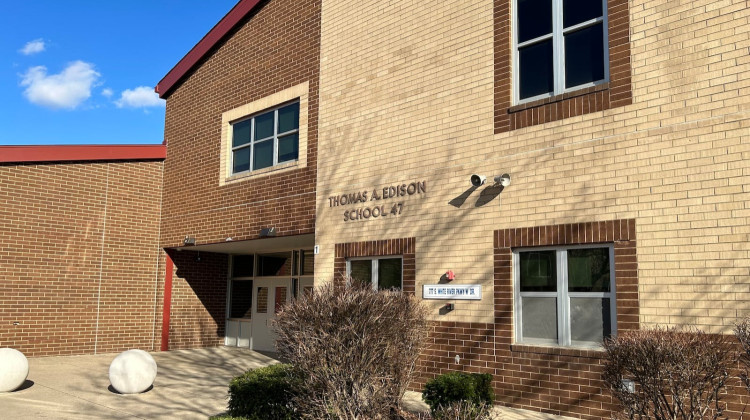
Ivy Tech Community College overhauled remedial education over the last decade. Leaders said the changes have helped substantially more students graduate on time. Tiffani Butler is teaching English 111, which is required for many students, in Indianapolis.
Dylan Peers McCoy/WFYIWhen Precious Johnson enrolled at Ivy Tech Community College in Indianapolis, she was terrified. It had been years since she graduated high school, and she was a single mom raising a son with autism.
"I was trying to figure out how to juggle this with my son,” Johnson, 40, recalled recently. “How am I going to do this homework? I still have to go to work in the morning.”
The challenges Johnson faced might be unusual at many four-year college campuses. But community colleges are designed to educate students like her — adults with complicated lives and responsibilities outside of school.
For a long time, Indiana’s community college system seemed to be failing those students. When Johnson earned her associate degree in 2014, she was defying the odds. Less than 30 percent of her peers earned degrees or certificates six years after enrolling. And fewer than 1 in 20 students graduated from Ivy Tech on time.
But over the last decade, Ivy Tech, which serves about 74,000 students across the state, has made steady gains in completion rates. Two-year completion rates at Ivy Tech steadily improved from a dismal 5 percent for students who began in 2012 to 14 percent for the most recent cohort.
“Now, we're still operating off of a base that's too low, but all the trends are in the right direction,” said Teresa Lubbers, who served as Indiana Commissioner for Higher Education for 13 years and left that position in March.
Ivy Tech has something of a dual mission. On the one hand, it needs to serve its students. But it is also an essential tool for economic development in a state where there are more jobs that require postsecondary education than qualified workers.
The community college system has seen significant declines in enrollment in recent years, reducing the number of qualified workers it educates. Improving outcomes for students who do enroll is another way Ivy Tech can help educate more workers — and prepare more people for good jobs.
This also comes as Indiana faces its steepest decline in high school graduates going to college in a generation.
Lubbers and leaders at Ivy Tech point to several changes Indiana’s system has made over the years as it embraces practices that are backed by research or have shown success at other community colleges around the country.
Upending the old system
Remedial education was one of the first and most substantial areas overhauled. These courses typically cover the same material as high school and don't offer college credit.
Remedial classes just weren’t working, Lubbers said in an interview before she left office.
“You're putting people in standalone remedial courses, and they're using their financial aid, and it's taking them time, and they're less likely to be successful,” she said. “The conclusion was, we better do something differently.”
Ivy Tech restructured remediation, which is also known as developmental education, to allow students to take essential college-level courses as soon as they enrolled and push fewer students into remedial classes. That transformation was part of a national movement.
Susan Bickerstaff, a researcher at the Community College Research Center at Columbia University, said developmental education had a few problems. One was that the placement tests schools used to check if students were ready for college-level math and English weren’t very reliable.
“Under the old system, we were just placing too many students into developmental education,” Bickerstaff said.
Students could be pushed to take several semesters of developmental classes before they got to the college subjects they were interested in.
“College could be really deflating if in your first semester, you're basically taking what you took in high school,” Bickerstaff said.
So Ivy Tech made it a lot easier for students to show they were ready for college-level work, using evidence such as high school grades and scores on college admission tests. Now, students who are placed into remedial classes have the option to study and retake the assessment.
Those changes led to a staggering decline in remediation.
The number of Ivy Tech students identified as needing remediation dropped to about 13 percent in 2019 from about 67 percent in 2012, according to data from the Indiana Commission for Higher Education.
"It's an enormous success for us,” said Kara Monroe, who was provost at Ivy Tech from 2018 to January. “It marked a significant turnaround, at least in community colleges, about the way we talked about … student success.”

‘Very fast’ courses
For students who need help, Ivy Tech embraced a model called corequisites, which allows students to simultaneously enroll in developmental and college level math and English classes.
That’s the approach in Tiffani Butler’s English class.
English 111 is the “bread and butter” of the department, because most students must take it to earn their associate degrees, Butler said.
It’s a college-level class. But if students need remediation, they take a corequisite class to “help them give them the support that they need to be successful,” Butler said.
One of the students in both classes is Moise Toussaint, who emigrated from Haiti.
“I'm very, very motivated to achieve this goal,” said Toussaint, who needs to pass English for the Ivy Tech nursing program. But it’s a challenge to keep up with the pace.
“It's very fast. And you have to do a lot of stuff at the same time for both of them,” he said. “Then I have work too — I'm working at the same time.”
The class is a sprint for Toussaint because it’s only eight weeks long, rather than a traditional 16-week session. That’s another change that Ivy Tech embraced a few years ago: It shortened courses in a bid to keep students from dropping out and help them finish courses sooner.
The eight-week courses can be hard for students who are returning to school after years away, because it can take time to learn the skills they need to succeed as students, Butler said. Some students, for example, don’t even have laptops when they enroll.
“For students that are focused and ready for it, an eight-week format is wonderful because it does get them in and get them out,” Butler said. “But it’s not for everyone.”
Ivy Tech Provost Dean McCurdy, however, said that’s one of the changes that has helped the community college system continue to improve outcomes for students. Students are less likely to have a class interrupted by a problem outside of school when taking shorter courses, he said.
Students in short sessions are more likely to earn passing grades of C or better, compared to traditional 16-week classes, McCurdy said. Next semester, about three quarters of courses Ivy Tech offers will be eight-week sessions.
McCurdy said the system is looking for new ways to improve outcomes, such as incentivizing students to take steps that help them succeed. Those include meeting with an advisor and filling out the financial aid application.
“We know if students do these things it helps them keep momentum and stay enrolled,” he said. “We always work backwards from the outcomes that we're looking for.”
The changes at Ivy Tech have fueled dramatic gains. But Ivy Tech is now facing another pressing challenge as it tries to deal with substantial losses in enrollment.
And even as on-time completion rates have improved to 14 percent, there’s a long way to go. Most students who enroll in Ivy Tech still aren’t earning degrees.
Contact WFYI education reporter Dylan Peers McCoy at dmccoy@wfyi.org. Follow on Twitter: @dylanpmccoy.
 DONATE
DONATE






 Support WFYI. We can't do it without you.
Support WFYI. We can't do it without you.